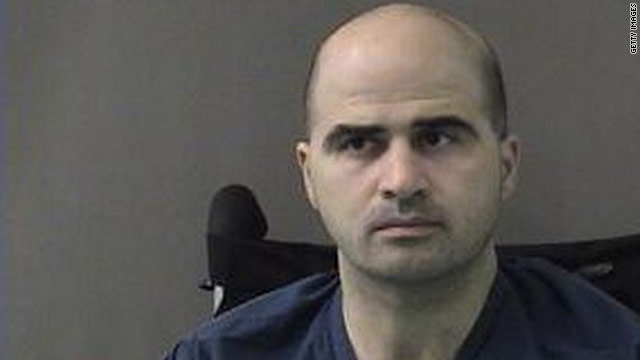Scammer
Banned

Fort Hood, Texas -- Tuesday marks the beginning of the military hearing for Maj. Nidal Hasan, the Army psychiatrist accused of killing 13 people and wounding 32 in a shooting spree at Fort Hood Army base in Texas.
The hearing will determine if Hasan will be court-martialed.
Hasan, 40, is scheduled to be wheeled into a military courtroom Tuesday for the start of the hearing as he is paralyzed from the upper chest down after civilian police shot him four times.
During the proceeding, called an Article 32 hearing, officials will consider the evidence against Hasan and decide whether the case will move forward to a court-martial that could bring the death penalty.
The hearing is open to the public, and both the defense and prosecution can present witnesses and evidence.
Army prosecutors have refused to speak publicly about the case or release a witness list. They are expected to call every person wounded in the shootings, as well as others, to provide a second-by-second account of what happened on November 5, 2009.
John Galligan, Hasan's civilian attorney, had wanted the hearing closed to the public, but his motion was denied.
Hasan, a U.S.-born citizen of Palestinian descent, faces 13 counts of first-degree murder for allegedly opening fire at the Soldier Readiness Processing Center at Fort Hood, killing 12 soldiers and a civilian. He also is charged with 32 counts of attempted premeditated murder for the 30 military personnel and two civilians wounded at the center, where soldiers prepare to deploy for Afghanistan and Iraq.
The shootings at the nation's largest Army post, in central Texas between Dallas and San Antonio, shocked the nation and raised questions about whether a so-called homegrown terrorist had operated within the military system without detection.
The Article 32 hearing is not expected to provide answers to why Hasan, who had communicated with a known Islamic extremist and made anti-U.S. comments, was promoted nonetheless.
At the time of the shootings, Hasan was scheduled to deploy to Afghanistan, military officials said.
The FBI has said it was aware of communication between Hasan and Anwar al-Awlaki, a Yemeni-American cleric who has promoted jihad against the United States and other Western countries. But investigators had determined those contacts were "consistent with research being conducted by Maj. Hasan."
Clerics at the Dar Al-Hijrah Islamic Center in Falls Church, Virginia -- which Hasan attended when he lived in the area -- described him as a loner.
Shaikh Shaker Elsayed said they were not successful in finding him a wife, and Imam Johari Abdul-Malik said some people believed Hasan changed after his mother's death in 2001.
Legal jockeying so far indicates the Article 32 hearing will be contentious. Last week, Galligan said he instructed Hasan not to cooperate with a government-ordered psychiatric evaluation.
Col. Morgan Lamb, the officer overseeing the case, had indicated in January that the military would not "meet with, test or examine" Hasan until after the Article 32 hearing.
But in a recent memo obtained by CNN, Lamb said he reversed his decision after the defense said in court last month that it may introduce mental capacity evidence for consideration in the case.
Galligan denied the defense had made such a statement.
The hearing could stretch into November, with the prosecution set to present its case through October 29, followed by a one-week recess when Fort Hood will mark the first anniversary of the shootings, referred to by some as "5/11."
For Jessica Hansen, the fiance of wounded Staff Sgt. Patrick Zeigler, the hearing will be the first step of what she believes will be a long process to bring justice to the victims, including Zeigler, who was hospitalized for 10 months in Texas and Minnesota.
With all the attention on Hasan as the hearing approached, she said she "cringed" at how some of those wounded in the shootings struggled alone and unnoticed.
